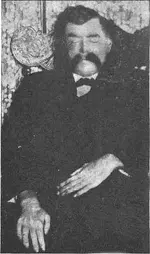In just the last two post (#40 & #41) we have two different stories "speculating" that Booth was indeed paid and even where the money came from. Who knows for certain, but obviously both of the presented claims can't be correct even though both appear to be well researched claims. But if all this "wealth" was at work in the planned killing of Lincoln then not a trace of it reared its ugly head even when it was needed the most - during the escape. In fact, the escape appears to be one completely lacking in money, sound planning, and resources. "Here you go John. Hopefully you'll eventually be able to find a boat to cross the river, then maybe hide in barns and such until you're in the clear." I mean, if this was the work of an intelligent, large, influential, and well funded organization, they sure dropped the ball BIG TIME.
Booth was not in the barn. It was a man named "Boyd" with red hair and freckles. That is why they sewed the body up into a blanket to bring it back. Think about it, if you just shot and killed the most wanted man in the United States, would you hide the body from everybody? Would you strap him on the hood like a trophy buck and show him off to everybody on the way back............

getting free beers and cheers all the way back like the heroes that just captured and killed that assassin of the President of the United States?
Why do you suspect that the secret service men stole the body and would not stop for the army to catch up? Maybe they didn't want anyone in the Union Army detachment getting a better look at the body in the daylight on the way back??
From the Military report:
The command consisted of twenty-six enlisted men of the Sixteenth New York Cavalry, and E. P. DOHERTY,
First Lieutenant, Sixteenth New York Cavalry, commanding the detachment and the two gentlemen, Messrs. Conger and Baker, sent by Colonel Baker, making a total in all of twenty-nine men.
The assassin Booth lived about two hours. In the meantime a doctor was procured, who remained with Booth till he died. I procured a wagon,
sewed up the body in a blanket myself, and placed it in the wagon. I then proceeded to Port Royal, where we arrived at 9 a.m. April 26, 1865, and crossed the river in a scow. While crossing my command Mr. Baker, without authority, moved off with the body of the assassin, taking with him the two men who had been previously detailed as a guard to the body, also one of the prisoners (Captain Jett, rebel). I was some time crossing my command, and experienced some difficulty in bringing Herold and the two Garretts along, having only one horse to mount the three; thus delay was occasioned. After proceeding some distance I procured an additional horse.
Fearing some accident might happen to the body of the assassin and the prisoner Jett, whom Mr. Baker had taken with him. I dispatched an orderly to tell Mr. Baker to halt. The orderly rode over four miles at full speed, when, overtaking Mr. Baker, he told him to halt until the column came up. This Mr. Baker, however, did not do, but continued on missing me and the road.
I arrived at Belle Plain at 6 p.m., and found the corpse had not yet arrived. I felt great anxiety, and was about to apply to Major Bosworth, Sixteenth New York Cavalry, who was at Belle Plain with his command, for a detachment of men to go in search of the body, when Mr. Baker arrived. I immediately asked him where the prisoner, Captain Jett, was. He replied, "he did not know; he had escaped." After a short delay the body of the assassin Booth was placed on board the steamer John S. Ide, and we proceeded to Washington, where I delivered over the body of Booth, Herold, and the two Garretts to Col. L. C. Baker, at 3 a.m. the 27th day of April, 1865.
Thanks, L.C.Baker
P.S. Why would the Army commander have anxiety and distrust for the secret service men that stole the body and took off with it?



 getting free beers and cheers all the way back like the heroes that just captured and killed that assassin of the President of the United States?
getting free beers and cheers all the way back like the heroes that just captured and killed that assassin of the President of the United States?

